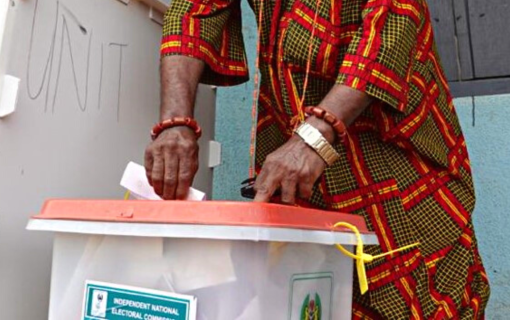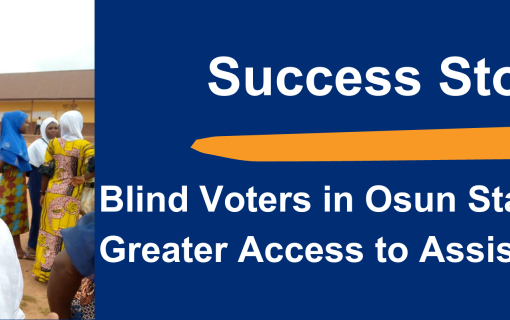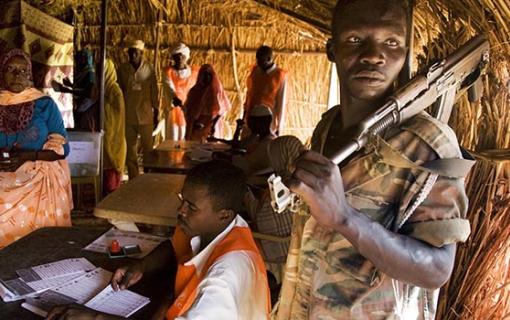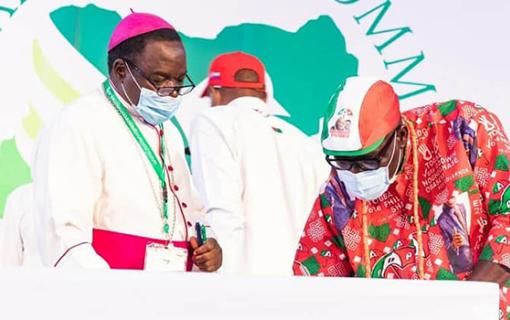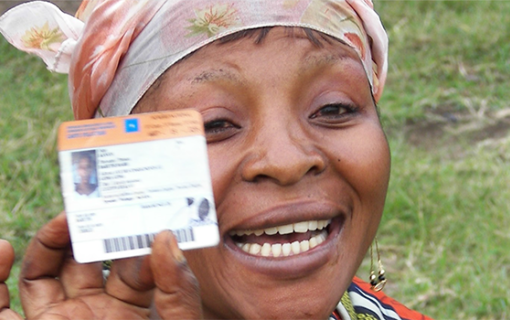
Nigerian President Buhari Reaffirms Commitment to Democratic Governance, Thanks CEPPS Partners
Nigeria’s 2015 general elections marked a historic triumph for democracy in Africa’s most populous country and largest economy, despite concerns over violence and the credibility of the polls leading up to the vote. The election of Muhammadu Buhari marked the first time an opposition candidate defeated an incumbent President through the ballot box. On the tail end of his first trip to Washington, D.C. as head of state, President Buhari spoke before a packed house at the United States Institute of Peace (USIP) at an event co-sponsored by the International Foundation for Electoral Systems (IFES), the Atlantic Council, the Center for Strategic and International Studies (CSIS), the National Democratic Institute (NDI) and the International Republican Institute (IRI). During his address, President Buhari addressed the many challenges facing the country he must now lead, including Boko Haram and other security issues; corruption and the need for improved governance; economic and development challenges; and the impact of Nigeria’s watershed 2015 elections.
President Buhari began his address by highlighting the important role that the Consortium for Elections and Political Process Strengthening (CEPPS) partners (IFES, NDI and IRI) have played in improving elections in Nigeria. “NDI, IRI, and IFES have for a long period been partners in Nigeria’s electoral processes,” Nigeria’s newly elected leader noted. IFES has been in Nigeria since 1998, working to strengthen the capacity of Nigerian election management bodies to promote credible, inclusive and transparent elections at national and local levels. “The contributions of the IRI, NDI and IFES to the success of the 2015 general elections in Nigeria are well documented. I would like to use this opportunity to thank them for their partnership and support to the democratization process in Nigeria,” President Buhari added.
Nigeria began its transition to democracy in 1999 and has seen a steady improvement in the credibility and transparency of its elections ever since. President Buhari praised the CEPPS partners for “calling a spade a spade in 2003, 2007 and 2011,” referring to the widely criticized elections, which he said has been “greatly appreciated by us Nigerians who are dedicated to ensuring free and fair elections in our country.” Along with CEPPS, President Buhari also highlighted the role of the Independent National Electoral Commission (INEC) in the conduct and administration of the electoral process. IFES has been engaged with INEC, in what President and CEO Bill Sweeney has referred to as a “remarkable partnership,” working closely to improve the credibility of Nigerian elections. “As Nigeria prepares for its complex and important 2015 general elections, IFES and the INEC have closely collaborated to ensure the credibility of and trust in the vote,” Sweeney wrote ahead of the 2015 polls. In September, IFES will award former INEC Chairman Professor Attahiru Jega with its 2015 Charles T. Manatt Democracy Award for his immense contributions to instituting professionalism and integrity within the INEC and his steadfast efforts to give Nigerians the right to have a vote and a voice.
In opening remarks, USIP President Nancy Lindborg highlighted the effect of Nigeria’s democratic triumph, calling it a “remarkable achievement” that is “a milestone … for the entire continent.” Emphasizing President Buhari’s commitment to democracy even after losing three tainted elections, the event’s moderator, Ambassador Johnnie Carson, a former Assistant Secretary of State for the Bureau of African Affairs and Ambassador to several countries on the continent, noted, “President Buhari never gave up on democracy and he never gave up on the electoral process. He never abandoned the social and ethical convictions that have guided him throughout his life and that motivated him to run for his country’s highest office.”
At an event hosted by CSIS in June, Professor Jega asserted, “Good elections are important, but not enough for effective governance and socio-economic development, they are only the starting point.” Hitting on a similar refrain in an op-ed for The Washington Post, President Buhari acknowledged that now is the time to capitalize on Nigeria’s positive democratic momentum: “I was elected on a platform of change. I know this is what the people of Nigeria desire more than anything else. I know they are impatient for action.” Despite the manifold challenges facing Nigeria, the 2015 elections and President Buhari’s expressed commitment to democratic governance provide an important step toward democratic consolidation in his country and across Africa. In concluding his remarks at USIP, President Buhari affirmed that view, noting, “I believe that the future of Nigeria, indeed the future of Africa, lies in democratic governance, not only because it is the expression of the will of the people, but because democracy can help us build fair, just and inclusive societies.”
To read a transcript of President Buhari’s remarks, please click here.




